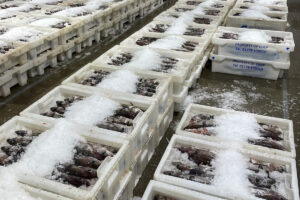The Annual UK/Norway seafood summit, held in Fishmonger’s Hall, reconvened last week after a two-year Covid hiatus. It opened with speeches from Norwegian minister for fisheries and ocean policy Bjørnar Skjæran and UK fisheries minister Mark Spencer, in front of nearly 200 attendees.
Mr Skjæran provided the Norwegian perspective. The summit was, he said ‘about honouring and celebrating the close relationship between Norway and the UK, and joint future opportunities’.
“Seafood has an important role to play in future food systems and is a vital part of a healthy and sustainable diet. Increasing seafood consumption, both in the context of sustainability and health benefits, is a shared agenda for Norway and the UK.”
The Defra minister responded in kind, saying: “The United Kingdom and Norway have a historic and strong relationship, one of friendship, co-operation and respect.
“I look forward to continuing to work together closely over the coming years, and promoting our shared commitments to supporting an economically viable fishing industry while safeguarding our marine environment for future generations.”
Disagreement on shares of mackerel and blue whiting was not allowed to spoil the mood music. Renewed access to the Norway EEZ last year was widely welcomed by sections of the whitefish fleet able to target the much larger run of haddock found in the deeper water there.
The surprise came when Mark Spencer confirmed that the ongoing replacement by Norwegian imports of UK-caught cod and haddock from waters further north seemed set to become a permanent fixture.
Commenting on the loss of whitefish quotas to Hull-based freezer trawler owner UK Fisheries – a post-Brexit result of shutting down the historic agreement to swap out blue whiting quota to Norway in return – he said: “I think we probably struck that balance [of quota shares] as well as we could. And we have to try and strike that balance not only between the devolved administrations, for the Scottish, English, Welsh and Northern Irish fishermen.
“You might identify the Kirkella as one of those that would seek to exploit more quota if it were available,” he added. “But we have to ensure it is shared sustainably and fairly.”

Despite increased haddock landings into the UK, such as this 1,000-plus boxes of top-quality fish landed last month by John Buchan’s Ocean Endeavour PD 625, the UK seems set to rely on imports for an increasing proportion of the haddock eaten by British consumers. (Photo: John Buchan)
Responding after the event, Jane Sandell, CEO of UK Fisheries, said: “If Mark Spencer thinks that we have ‘struck the balance as well as we could’, then he is clearly deluding himself. Unfortunately, Defra seems to have stopped listening to the concerns of English fishermen.
“We have repeatedly offered to meet him to propose a deal that would protect the interests of all of the British fishing industry, and not just a handful of pelagic vessels. That invitation is still open.
“As the minister knows, or should know, we’re not asking for ‘additional quota’ – only what we were fishing before Brexit. We now have less than half that, and have been forced to lay off 72 crew in the North East. This is entirely and exclusively down to the increasingly biased priorities at Defra that benefit only a tiny handful of pelagic fishers.”
A series of presentations made at the summit outlined the growing share of UK seafood imports that come from Norway, which in 2022 accounted for 44% of the UK’s salmon consumption, and for the last two years has overtaken the UK fleet as the largest provider of haddock eaten by UK consumers.
The summit also examined the continuing changes in UK seafood consumption, which has seen
a continued growth of seafood eaten at home. Overall, an extra billion portions of food are now eaten at home in the UK every three months, the summit heard, compared to pre-pandemic levels. This was bad for the seafood industry, with seafoods taking a lower share of this market relative to consumption when eating out.
‘Tired supermarket displays and seafood products’ could be part of the issue, one speaker said, with Norway highlighting efforts made in both the UK and Norway to reach out to consumers with newer, more attractive products.
Norwegian Seafood Council UK director Victoria Braathen told the summit that the council had three priorities in the UK for 2023 – the fish and chip shop sector, where the emphasis would be on sustainability, the service sector, concentrating on reaching more chefs, and developing a better brand perception for Norwegian seafoods in UK supermarkets.
This story was taken from the latest issue of Fishing News. For more up-to-date and in-depth reports on the UK and Irish commercial fishing sector, subscribe to Fishing News here or buy the latest single issue for just £3.30 here.
Sign up to Fishing News’ FREE e-newsletter here.








